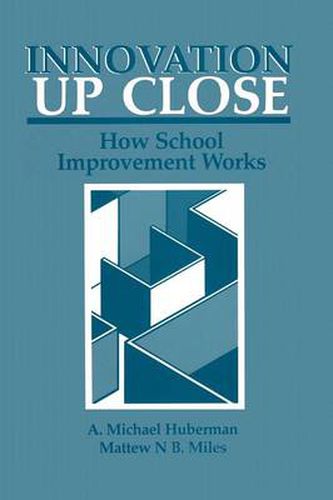Readings Newsletter
Become a Readings Member to make your shopping experience even easier.
Sign in or sign up for free!
You’re not far away from qualifying for FREE standard shipping within Australia
You’ve qualified for FREE standard shipping within Australia
The cart is loading…






This title is printed to order. This book may have been self-published. If so, we cannot guarantee the quality of the content. In the main most books will have gone through the editing process however some may not. We therefore suggest that you be aware of this before ordering this book. If in doubt check either the author or publisher’s details as we are unable to accept any returns unless they are faulty. Please contact us if you have any questions.
School improvement, like motherhood, has many advocates. Everyone is for it, without having to campaign actively on its behalf. And just as the 100% of people who have had mothers think they know how mothering could be done better, so the (nearly) 100% of people who have been pupils in schools, or have even taught in or managed them, think they know how schools can be im proved. More precisely, they are sure that schools ought to be improved. The trouble is that they propose a staggering, conflicting range of methods of improving the schools, from ;‘back to the woodshed to teacher merit pay, a stiffer curriculum, a stronger tax base, reorganization, a more humane climate, teacher-proof innovations, community involvement-the list is nearly end less. Furthermore, the issues are not merely technical, but normative and po litical. The term improvement is itself problematic. One person’s version of improvement is another’s version of wastefulness or even of worsening the schools. Furthermore, the versions that win out in any particular school are not Improvement sometimes turns out to be merely a necessarily technically best.
code word for the directives that administrators have successfully put into place, or for the agreements that teachers have lobbied into being. How much do we really know about school improvement? The available research literature is quite substantial, but not as helpful as it might be.
$9.00 standard shipping within Australia
FREE standard shipping within Australia for orders over $100.00
Express & International shipping calculated at checkout
This title is printed to order. This book may have been self-published. If so, we cannot guarantee the quality of the content. In the main most books will have gone through the editing process however some may not. We therefore suggest that you be aware of this before ordering this book. If in doubt check either the author or publisher’s details as we are unable to accept any returns unless they are faulty. Please contact us if you have any questions.
School improvement, like motherhood, has many advocates. Everyone is for it, without having to campaign actively on its behalf. And just as the 100% of people who have had mothers think they know how mothering could be done better, so the (nearly) 100% of people who have been pupils in schools, or have even taught in or managed them, think they know how schools can be im proved. More precisely, they are sure that schools ought to be improved. The trouble is that they propose a staggering, conflicting range of methods of improving the schools, from ;‘back to the woodshed to teacher merit pay, a stiffer curriculum, a stronger tax base, reorganization, a more humane climate, teacher-proof innovations, community involvement-the list is nearly end less. Furthermore, the issues are not merely technical, but normative and po litical. The term improvement is itself problematic. One person’s version of improvement is another’s version of wastefulness or even of worsening the schools. Furthermore, the versions that win out in any particular school are not Improvement sometimes turns out to be merely a necessarily technically best.
code word for the directives that administrators have successfully put into place, or for the agreements that teachers have lobbied into being. How much do we really know about school improvement? The available research literature is quite substantial, but not as helpful as it might be.